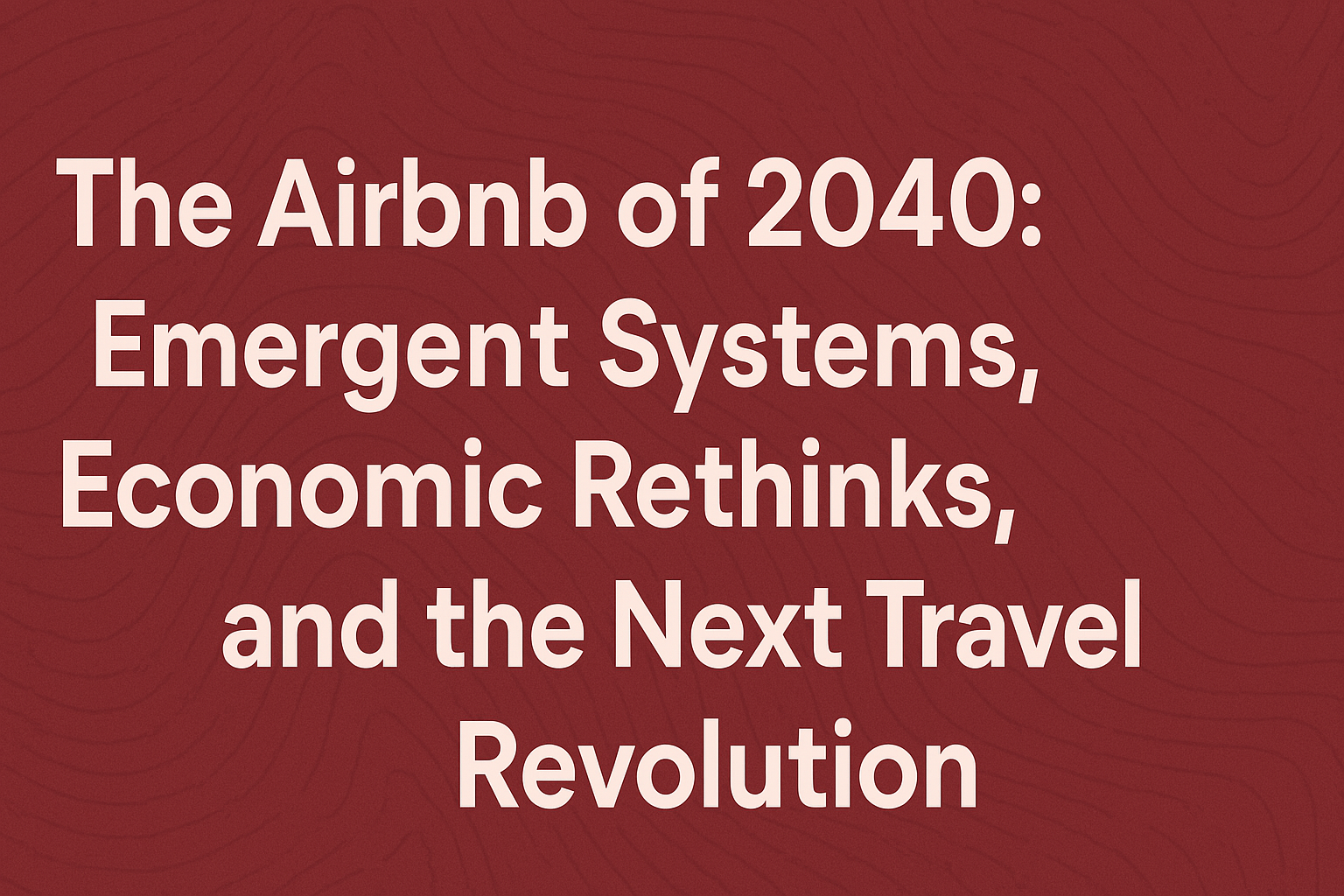The Airbnb of 2040: Emergent Systems, Economic Rethinks, and the Next Travel Revolution
Most current accommodation models are reductionist—simplifying tourism into transactions (hotel = room + fee). But real-world tourism is a complex adaptive system. To understand what comes next, we need to apply emergent complexity theory, which sees value as arising from relationships, feedback loops, and bottom-up innovation.

What Came After Airbnb?
Airbnb disrupted traditional hospitality by democratizing access to accommodation, empowering homeowners to monetize spare space, and offering travelers unique, localized experiences. But as it scaled, it morphed into something more corporate, often criticized for driving up rent, displacing communities, and enabling pseudo-hotels.
So what kind of system could come next? One that adapts to travelers' evolving needs while being sustainable, fair, and flexible. And where might we see these systems first? Likely in rural areas, among small hotels, or through grassroots collectives—places where innovation thrives without the weight of legacy infrastructure.
Why Reductionist Models Will Fail
Many current models treat tourism as a linear, input-output exchange. Book a room, pay a fee, leave a review. But tourism is not transactional—it's relational, contextual, and deeply embedded in place.
• Hotel Chains: Rigid and centralized, hotel chains struggle to adapt to local culture or changing traveler values.
• Airbnb Today: While more flexible than hotels, Airbnb's current iteration emphasizes profit and property accumulation. It often overlooks the broader consequences like community resistance, gentrification, and environmental degradation.
Key Limitations:
• These models treat users as isolated units, not as interconnected participants in a dynamic system.
• They ignore feedback loops, such as rising housing prices or neighborhood backlash, which can destabilize the platform over time.
Enter Emergent Complexity Theory
Emergence describes how complex outcomes arise from simple, local interactions. Think of ant colonies organizing without a central planner, or urban sprawl evolving based on individual land use decisions.
Key Principles to Apply:
• Bottom-Up Organization: Innovation will come from local operators—creative individuals who know their context and adapt quickly. These actors will drive new accommodation models by experimenting with formats, pricing, and experiences.
• Adaptive Feedback Loops: Systems that learn and adjust based on input from guests, hosts, and communities. For example, a local collective of guesthouses might dynamically shift availability or pricing in response to real-time demand and feedback.
• Self-Organization: Without central oversight, accommodation networks can emerge organically. Consider how independent eco-lodges might band together to share resources or standardize sustainability practices.
• Decentralized Control: Power shifts from corporations to communities, with tech facilitating coordination rather than imposing control.
• Phase Transitions (Tipping Points): Watch for moments when niche practices become mainstream. This could be triggered when a specific demographic (e.g., digital nomads, slow travelers) adopts a new model en masse, or when tech infrastructure enables rapid scaling.
Future Models That Might Work (Aligned with Complexity Thinking)
Geo-Coded AI Matchmaking
AI could move beyond static listings and power a dynamic, intent-based system. Instead of searching for a room, travelers input goals, preferences, and values. The AI then matches them to hosts or communities that align.
• Intent-driven Matching: AI considers travel purpose, mood, local events, and sustainability goals.
• Ecosystem Efficiency: Reduces vacancy, matches niche interests, and encourages interaction among aligned travelers.
• Context-aware Stays: A solo traveler seeking creativity might be placed in an artist collective; a family looking for calm might be routed to a farm stay with flexible arrangements.
Systems That Likely Won’t Work
Models that oversimplify, centralize, or ignore local realities are likely to fail.
🚩 Luxury-Only Subscription Models
Catering exclusively to elite travelers builds brittle systems, disconnected from broader travel trends. They resist adaptability and are vulnerable to economic shocks.
🚩 Hyper-Automated Smart Hotels
Over-emphasis on automation strips out cultural feedback and local nuance. These spaces often feel sterile and interchangeable, lacking the emotional intelligence that travelers increasingly seek.
🚩 Government-Run Tourist Housing
Top-down planning struggles to respond to dynamic demand. Without local stakeholder involvement, these initiatives often fall short of both economic and experiential goals.
Closing: The Role of AI + Complexity in Travel's Next Chapter
Tourism accommodation needs to evolve beyond rigid structures and embrace the messiness of ecosystems. The Airbnb of 2040 may not be a single platform, but a web of interconnected, adaptive models. These systems will prioritize relationships, learning, and local agency—and they will thrive not by managing complexity, but by being shaped by it.